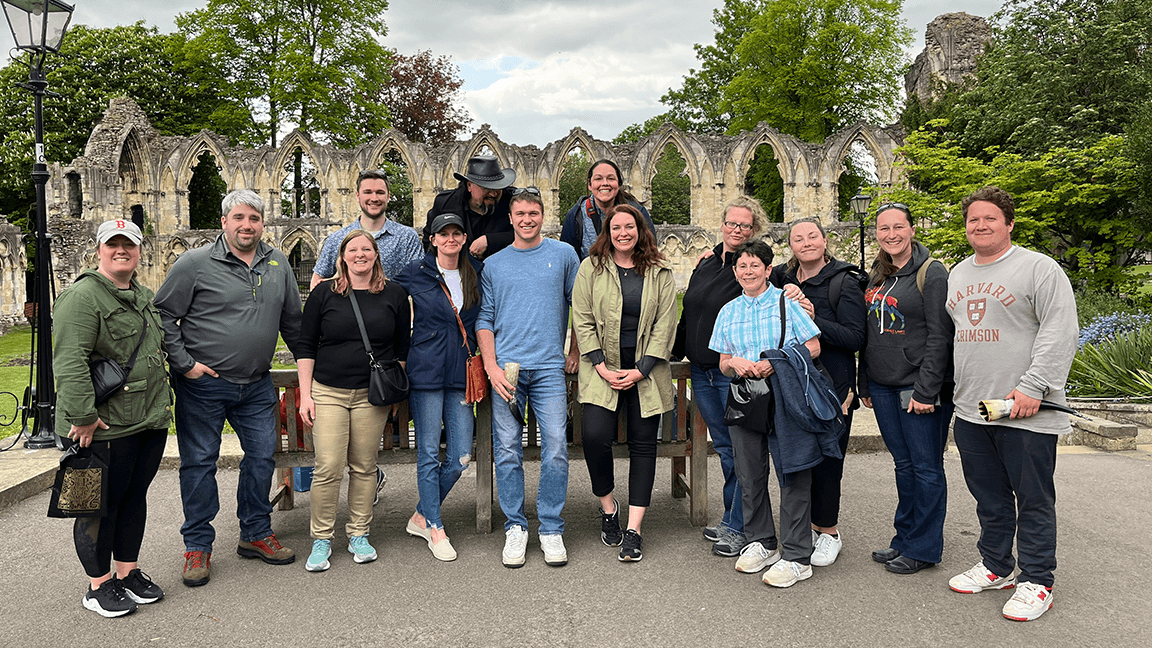
MaineMBA students learn about sustainable ecosystem economic development in the UK
In May 2023, a group of MaineMBA students traveled to the United Kingdom on a travel study trip with Dr. Nory Jones, Professor of Business Information Systems, and Mr. Derek Jones, Cooperating faculty of Business Law. Students learned about Sustainable Ecosystem Economic Development (SEED) through a hybrid course of traditional class time, research projects, and the international experiential learning trip.
“We had extraordinary visits with high-level government officials, business leaders, and leaders from important nonprofits,” says Dr. Nory Jones. “The insights they shared helped us understand how outdoor industries and nature-based tourism can drive economic development in rural, remote areas.”
The group experienced and learned about iconic places in England and Scotland, some of which are world heritage sites, including the Palaces of Westminster and the Old and New towns of Edinburgh. York provided an experience of walking century-old streets from Roman times. “Visiting the rugged, remote Isle of Skye in the Scottish Inner Hebrides was a once-in-a-lifetime experience for most of us,” Dr. Jones says.
Sustainable Ecosystem Economic Development is a framework for rural communities to work collaboratively with government agencies, businesses, and nonprofits to develop and maintain healthy, sustainable, thriving communities. The group traveled from London, England, to Edinburgh, Scotland, visiting companies that leverage culture and heritage to provide authentic experiences to visitors.
“Different countries have different cultures and approaches to tourism and sustainable business models,” says MaineMBA student Kathy Stovall. “This trip was an excellent opportunity to compare sustainable business practices between the U.S., particularly the State of Maine, and the U.K.”
In London, the group toured iconic landmarks such as the British History Museum, the Tower of London, and Hampton Court. They also met with government officials from the U.S. Department of Commerce and the House of Lords to learn about the role of government in the SEED model, including laws, taxes, policies, and grants.
On their fifth day in the U.K., the group boarded a train to York, England. There, a local guide shared the history and culture of the city. “The lessons learned as they relate to the SEED model is the power of leveraging the cultural identity to create destinations for authentic local experiences tourists seek,” Dr. Jones says.
Between York and Edinburgh, the students visited several businesses. They toured the Hardy Fishing Store and Museum, the gold standard for the fishing industry for more than 150 years; Stoats Oats, a unique startup committed to sustainability; and St. Andrews Old Course, the oldest golf course in the world. They also visited two distilleries, Tomatin Scotch Distillery and Talisker Whiskey Distillery. These businesses contribute to the community and the environment through sustainable practices.
The group also visited Loch Ness and the Scottish Highlands. They ended their trip with a visit to the beautiful Isle of Skye before returning to Maine.
“The trip broadened my perspective,” Stovall says. “I visited businesses that stayed in business for hundreds of years and listened to their stories. I tasted local foods and walked through historical sights. I met incredibly inspiring people who encouraged me to keep exploring the world and different cultures.”
